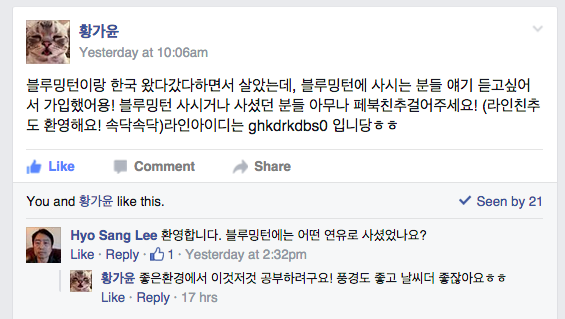풍경도 좋고 날씨도 좋잖아요.

| G1.2 ~잖아요 |
예쁘잖아요:
오늘 아침에 드렸잖아요 Didn't I give you this morning? I gave it to you this morning, didn't I? You know, I gave it to you.
| 자주 오잖아요. | |||
| 점원: | 어잇, 하나, 둘, 셋, 네 개. . | ||
화성인 a Martian |
화성인: | 천원만 깍아 주시면 안 돼요? | |
진짜 genuinly (colloquial,=정말) |
점원: | 아이, 진짜 안 돼요. |
|
| 화성인: | 아, 왜요? 자주 오잖아요. | ||
| 점원: | 아, 안 돼요. | ||
| 저번 (<지난 번) last time | 화성인: | 아이, 저번 주에도 왔잖아요. | |
특별히 specially |
점원: | 아, 그(러)면 자주 오시니까 오늘만 특별히 1000원 빼 드리겠습니다. | |
| 화성인: | 삼천원, 삼천원. 콜, 콜, 콜. | ||
| 로맨틱하잖아요 [하이킥: 짧은 다리의 역습 EP 45] | |||
| 피치 못 하다 to be inevidtable 결혼식 a wedding ceremony 참석 attendance |
교감 선생님 | . . .선생한테 내가 피치 못 할 일 때문에 결혼식 참석 못 해 미안하다구 거 잘 좀 얘기 좀 해 줘요. | |
| 박하선: | 네, 알겠습니다. | ||
| 조심하다 to be cautious 조심 운전 a safe driving< |
교감 선생님: | 아, 윤 선생님 차루 간다 그랬죠? |
|
| 박하선: | 어어, 눈 온대요? 와아 너무 좋다. | ||
| 미끄러워지다 to become slippery | 박지선: | 아, 애처럼 좋긴 뭐가 좋아. 눈 오믄 길만 미끄러워지지. | |
| 박하선: | 그래두 눈 오면 뭔가 로맨틱하잖아요. (그)것두 첫 눈이면. | ||
풍경도 좋고 날씨도 좋잖아요.
|
Used when the explanation is so obvious and the speaker assumes that the listener should know it.
Contracted from ~지 않아요, ~잖아요 is grammatically a question, in fact a negative question; 'Isn't it (obvoously) the case that . . .?' Or 'It is . . . , isn't it?' A negative question renders rhetorically a positive statement because the force of negation is cancelled by being put in question. Often the case, it is more equivalent to 'You know, . . .?' in English.
Cf. ~지 않아요?: the speaker is not as sure as with ~잖아요 about whether the listener would agree, so the speaker is checking up on it, whereas ~잖아요 assumes the listener's agreement.